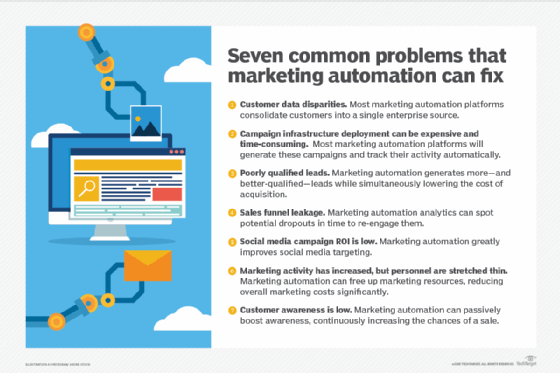
Getty Images/iStockphoto
Top 5 benefits of marketing automation
If an organization wants to help its marketers, it must invest in marketing automation. This software offers benefits such as better lead conversion and data collection.
Marketing teams of all sizes can benefit from incorporating automation into their workflows.
But what exactly is marketing automation? Marketing teams have many responsibilities and moving parts in their workflows, so they need a structured system that works in their favor. Marketing automation is a type of system or systems used to automate day-to-day tasks for marketing teams. It can streamline processes and ultimately help businesses grow.
Marketing automation can bring various advantages to marketers' daily workflows. Depending on specific teams' goals, different marketers may resonate with some of these benefits more than others.
1. Increases efficiency and productivity
Marketing automation can increase overall productivity. Automation of any kind aims to streamline work, so adopting tools to automate tasks and data collection can free up time for marketers to spend elsewhere.
Implementing automation also reduces the risk of human mistakes or errors that occur when manually completing tasks. Automation is like using a crockpot: Set it up once, then leave it alone.
Overall, marketers can save time with automation software. Instead of spending hours a day sifting through data, teams can focus on creative projects or brainstorm new ideas.
2. Aligns marketing and sales teams
Marketing and sales teams usually work cross-functionally, and often have the same goals. For example, businesses want to produce qualified marketing leads that eventually convert to sales leads. A marketing automation tool can help align business goals across multiple teams without bouncing back and forth.
With automation, these teams can communicate better, as they can see the data from both ends. Automation software makes information more easily accessible and enables both teams to work with current, up-to-date data.

3. Customizes content for target audience
Most marketers know the importance of personalized content when engaging with audiences, as modern consumers want tailored experiences. From the moment they land on a website through follow-up steps after they make a purchase, every step of the customer journey has the potential to nurture leads.
Marketing automation helps teams create customized content instead of offering a standard or one-size-fits-all solution. The software can collect specific data about a lead's interests and characteristics, then push content to those leads that aligns with their interests. This strategy leads to more engagement and encourages leads to convert to customers.
Marketing teams can also vary content depending on where they find leads -- like on landing pages, search engines, ads, email campaigns or social media, which each require different types of content.
4. Improves lead conversion
A marketing automation system can improve lead conversion rates. When the audience feels a brand has tailored content to their needs and interests, they're more likely to engage.
Then, the automation software tracks all that data on its own. This means teams can always revisit the information to revise their strategy and improve future lead conversions.
5. Helps organize data
Marketing teams collect a lot of data, so marketing automation software can sort and organize the information. The data then updates automatically and remains accessible to the entire team.
Plus, people make mistakes. Automation tools can limit the errors that occur when manually organizing digital information.
All companies and businesses can benefit from marketing automation. No matter what stage a business is in or what their marketing goals are, automation helps teams focus on the important work. Marketers who use automation software free up their time, enhance productivity and increase lead conversion rates.
Zaida Marston is a freelance content writer with more than 10 years of creative writing experience.








